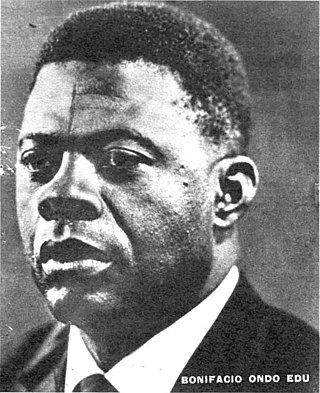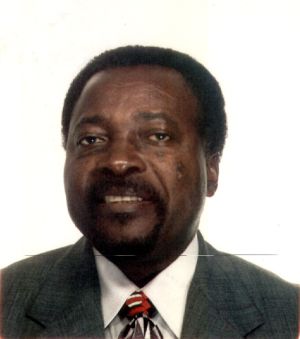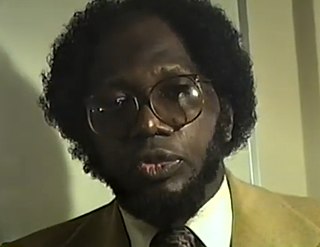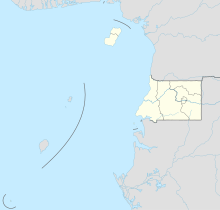
Equatorial Guinea, officially the Republic of Equatorial Guinea, is a country on the west coast of Central Africa, with an area of 28,000 square kilometres (11,000 sq mi). Formerly the colony of Spanish Guinea, its post-independence name refers to its location near both the Equator and in the African region of Guinea. As of 2024, the country had a population of 1,795,834, over 85% of whom are members of the Fang people, the country's dominant ethnic group. The Bubi people, indigenous to Bioko, are the second largest group at approximately 6.5% of the population.

The History of Equatorial Guinea is marked by centuries of colonial domination by the Portuguese, British and Spanish colonial empires, and by the local kingdoms.

This article lists transport in Equatorial Guinea.

Malabo is the capital of Equatorial Guinea and the province of Bioko Norte. It is located on the north coast of the island of Bioko. In 2018, the city had a population of approximately 297,000 inhabitants.

Equatorial Guinea's culture has been less documented than most African countries, and commercial recordings remain scarce.

Bonifacio Ondó Edú-Aguong was an Equatoguinean politician who served as the Prime Minister of Equatorial Guinea from 1964 to 1968 while it was still under Spanish colonial rule, as Spanish Guinea. He played a leading role in the country's independence, and led the National Union Movement of Equatorial Guinea from 1959 until his death.

Corisco, Mandj, or Mandyi, is a small island of Equatorial Guinea, located 29 km (18 mi) southwest of the Río Muni estuary that defines the border with Gabon. Corisco, whose name derives from the Portuguese word for lightning, has an area of 14 km2 (5 sq mi), and its highest point is 35 m (115 ft) above sea level. The most important settlement on the island is Gobe.

Annobón is a province of Equatorial Guinea. The province consists of the island of Annobón and its associated islets in the Gulf of Guinea. Annobón is the smallest province of Equatorial Guinea in both area and population. According to the 2015 census, Annobón had 5,314 inhabitants, a small population increase from the 5,008 registered by the 2001 census. The official language is Spanish but most of the inhabitants speak a creole form of Portuguese. The island's main industries are fishing and forestry.

Leandro Mbomio Nsue Edú-Aguong was an Equatorial Guinean sculptor and artist, and former minister of Education and minister of information, tourism, art and culture.

Adolfo Obiang Biko is an author, politician and president of the National Liberation Movement of Equatorial Guinea (MONALIGE). He is known as an active participant and a leading freedom fighter in the struggle for independence of Equatorial Guinea from Spain.
According to Article 3 of the Constitution of Equatorial Guinea, the country is divided for administrative and economic purposes into regions, provinces, districts, and municipalities. In practice, the provinces serve as the first-level administrative divisions. Municipalities are subdivided into village councils and neighbourhood communities. Many of the sub-municipal entities are grouped into urban districts, which remain subordinate to municipalities and are distinct from districts proper.

The second President of Gabon, Omar Bongo, died in Spain on 8 June 2009, after having suffered from colorectal cancer. A month of mourning and state funeral, spanning 11 to 18 June, followed.

Equatorial Guinea–Spain relations are the diplomatic relations between Equatorial Guinea and Spain. Both nations are members of the Association of Academies of the Spanish Language, Organization of Ibero-American States and the United Nations.
The Supreme Military Council — initially called the Military Revolutionary Council — was the ruling military junta and the de facto government of Equatorial Guinea between the 1979 coup d'état and the 1982 constitutional referendum.

The nations of Equatorial Guinea and Mexico established diplomatic relations in 1975. Both nations are members of the Association of Academies of the Spanish Language, Organization of Ibero-American States and the United Nations.

Equatorial Guinea–Venezuela relations refers to international relations between Equatorial Guinea and Venezuela. In both countries the official language is Spanish and they have an important economic activity based on oil extraction.
Malabo Mosque also known as Malabo Central Mosque is a mosque in Malabo, Equatorial Guinea. It is the largest mosque in Equatorial Guinea and can accommodate two thousand people.

Minister of Finance of Equatorial Guinea is a political position in the Cabinet of Equatorial Guinea.
Felipe Hinestrosa Ikaka was a Equatorial Guinean politician. He hailed from the island of Corisco. He served as Minister of Finance. Hinestrosa Ikaka died in 1998.
















